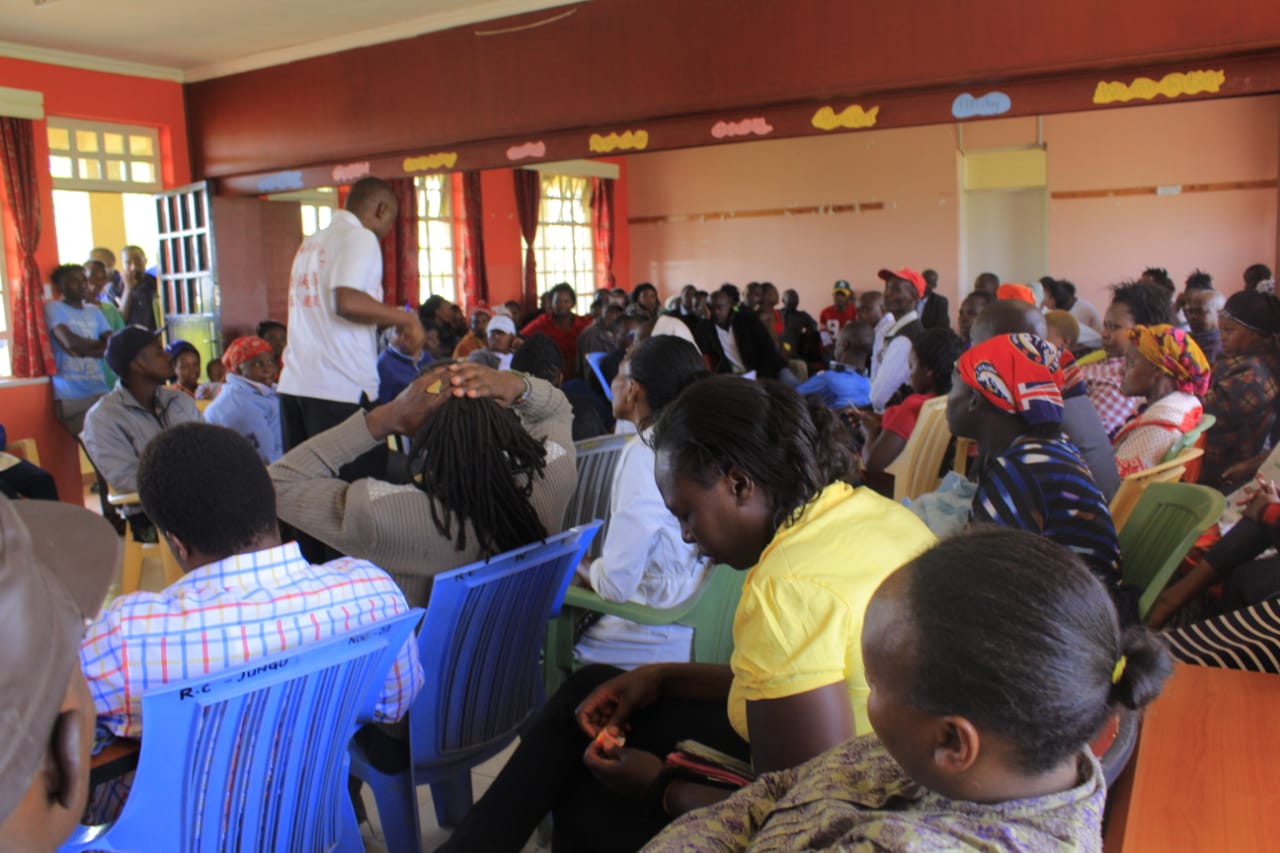Water, sanitation & energy consultation: Mukuru kwa Reuben segment 2
Photo: Muungano KYCTV
Where? Reuben Centre, Mukuru
When? Tuesday 2 October 2018
What? Water, sanitation and energy consortium consultation (Muungano alliance, Oxfam, Sanergy, Strathmore University, Nairobi Water Company,
Who? 100 resident representatives of SPA Mukuru kwa Reuben segment 2 (villages of Bins, Simba Cool, Feed the Children & Rurie); representatives from the WSE consortium; Muungano facilitators.
>What is a segment and how are the consultations organised?
Aims:
This is the first of three sets of community consultations by the water, sanitation and energy consortium of the SPA.
This first set of consultation meetings are segment-level dreaming sessions, where residents share their views and aspirations with the consortium, and where the consortium works with the community to identify issues and challenges, community priorities, and ideas for potential solutions – all relating to water, sanitation and energy.
After the first consultation meetings, the consortium will develop a draft sectoral plan for the segment – this draft sectoral plan will be derived from the dreams shared in the first set of consultation meetings and tested against the existing reality of Mukuru.
In the second set of meetings, also at segment level, the consortium will seek residents’ feedback on these draft plans, which will then be revised accordingly.
In the third set of meetings, all 8 of the SPA consortiums will together share the final integrated development plan, for adoption by Mukuru’s residents.
Brief notes on the discussion:
Sanitation
Photo: Muungano KYCTV
Issues
Shortage of facilities because the community doesn’t have funds to construct
Insecurity – residents don’t feel safe accessing at night, which leads to use of ‘flying toilets’
The deficit in facilities in the area, this gives rise to sickness: diarrhoea, typhoid, parasitic infections
Ideas for solutions
The publicly-provided toilets that are there are in an unusable state; they need to be mended
Drainage needs to be better constructed; pipes need to be wide enough to take the volumes that are the reality.
Available/existing plots (in this context, a plot is 10 households living together in separate rooms under one structure) should consider constructing at the that plot scale – either as residents coming together, or by structure owners.
Any new structures being constructed should be encouraged to put sanitation facilities in at the plot level.
Water
Photo: Muungano wa Wanavijiji
Issues:
Existing plastic pipes leak easily, contaminating water supplies.
Frequent water rationing leads to inconsistencies in supply (this is partly because suppliers are often small-scale individuals, or cartels).
No fixed tariffs: today water can be 10 KSH; tomorrow the same amount can be 50 KSH.
Not enough water points.
Ideas for solutions:
Put in place a (much cheaper) water token system, as in other informal settlements like Mathare.
Crack down on the cartels – they are too difficult to reason with to be part of a solution.
Have a more distributed water system, to bring water closer to people, rather than the very few sources at present.
More community-run water points.
Government’s role should be to provide the pipes.
Energy
Photo: Muungano wa Wanavijiji
Issues:
Electricity: demand surpasses supply. Residents are many and this has given rise to cartels and illegal connections.
Electricity: transformer failures are common. When one blows, no one has electricity.
Kerosene: expensive because its people’s only option.
Kerosene: health hazards from fumes.
Ideas for solutions:
Electricity: address the poverty penalty by lowering token prices (expensive token system is used even for formal connections.
Electricity: create more awareness of the dangers of using illegal connections.
Kerosene: consider biogas alternatives.
Bring in a hire-purchase system for gas cylinders.
Other points made during the discussion
The community must use these consultations as an opportunity to find a way forward, without just putting all the blame on the rich.
The time it takes residents to queue for water is too much. We should look for a solution that reduces this, so that that time can be better used for other activities.
Implementing projects at the whole-community level can be less efficient, or carry a greater risk of being hijacked or disrupted by individuals for their own gain. In some cases, implementing changes at the (smaller) plot level can be easier to monitor and therefore mitigate these risk.
Post-consultation interviews
Voices: the residents
John Kitunga and Mary Majala, two residents of Mukuru kwa Reuben, give their views on what was talked about at the consultation.
Voices: the consortiums
Patrick Njoroge, who works for Muungano wa Wanavijiji, on what he heard.
Voices: the community mobilizers
Veronica Kamau, community mobilizer and resident of Mukuru kwa Reuben, on her impressions of the consultation.





